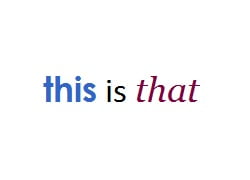 Metaphor allows us to talk about things in a descriptive or poetic way, and gives us a fresh way of thinking about something. Take Jacques' opening monologue in As You Like It - "All the world's a stage, and all the men and women merely players." This comparison of life to a play could inspire many different interpretations, perhaps giving us a powerful impression of our place in the world, or the brevity of life.
Metaphor allows us to talk about things in a descriptive or poetic way, and gives us a fresh way of thinking about something. Take Jacques' opening monologue in As You Like It - "All the world's a stage, and all the men and women merely players." This comparison of life to a play could inspire many different interpretations, perhaps giving us a powerful impression of our place in the world, or the brevity of life.
However, metaphors aren't merely a part of the language we use. They shape the very way in which we think. In Metaphors We Live By, Lakoff and Johnson discuss the example of arguments, which we often talk about as though they were similar to war — 'His argument was blown out of the water', 'They battled for hours', 'She won the argument'. They call these overarching metaphors — such as ARGUMENT IS WAR — conceptual metaphors. These 'organising' metaphors are so deeply embedded in our way of thinking that they seem quite natural to us. However, Lakoff and Johnson suggest that these conceptual metaphors are not beyond change — could life be quite different if, for example, we saw arguments through a conceptual metaphor of ARGUMENT IS DANCE?
When we stop to think about the influence of metaphor, we realise that it is inescapable, and extremely influential. How many relationships have ABBA ruined with their conceptual metaphor of RELATIONSHIPS ARE A GAME in 'The Winner Takes It All'? Use of metaphor in this way can have a profound ideological effect due to the ease with which we understand and take up new metaphors. Below are a few examples of metaphor gathered from the Language in Conflict Twitter feed. Think about how these metaphors affect our perception of the world around us. Can you think of alternative conceptual metaphors that might allow us to think about subjects in a different way?
- IMMIGRANTS ARE INVADERS — the likening of immigration to an invasion, or even a natural disaster, is very common. In spite of the sensitivity of this topic, we are accustomed to hearing about 'floods of immigrants', 'deluges of foreigners' and 'invasions from abroad'. The possible dehumanising effects of such metaphorical language are discussed in a Guardian article, as well as the fact that the use of the IMMIGRANTS ARE INVADERS metaphor tends to be hyperbolic and melodramatic. The press's use of this metaphor has also received linguistic attention in a paper by Gabrielatos and Baker (2008).
- Gun metaphors — a recent NPR programme discusses the prominence of gun-oriented phrases in our language — 'shooting from the hip', 'delivering the silver bullet', 'biting the bullet'. This metaphorical language has even been used in political discussion regarding the control of gun violence in the United States, with Vice President Joe Biden suggesting that "there is no silver bullet" for the situation, and saying "I'm shooting for Tuesday" in response to a question regarding when new proposals might be made. On the programme, Katherine Connor Martin suggests that the readiness with which we use these metaphors could serve to demean the seriousness of instances when phrases like 'coming under fire' might have a very literal, real use.
- POLITICS IS A GAME — metaphors comparing politics to a game might be seen to be quite damaging. Some might suggest that such important matters should not be treated as though they are as trivial as a simple game, while others might feel that the idea of politicians 'competing' with each other and trying to 'win', rather than seeking to achieve positive things for their electorate through cooperation, seems rather unhealthy. However, a recent Guardian editorial noted that the POLITICS IS A GAME metaphor has a long history, reflecting on Major Streatfield's recent comparison of the political situation in Afghanistan to a cricket match — "We put the Taliban into bat in 2001 and took a flurry of early wickets...with half an hour to play we find ourselves some runs short."
These are just a few examples of how metaphor is used in conflict, and the reporting of conflict. Have you come across other examples of conceptual metaphors recently that may be particularly harmful or helpful? Share your ideas and thoughts in the comments section below.
To learn more about metaphor, visit Metaphor and Simile in the Linguistic Toolbox.




